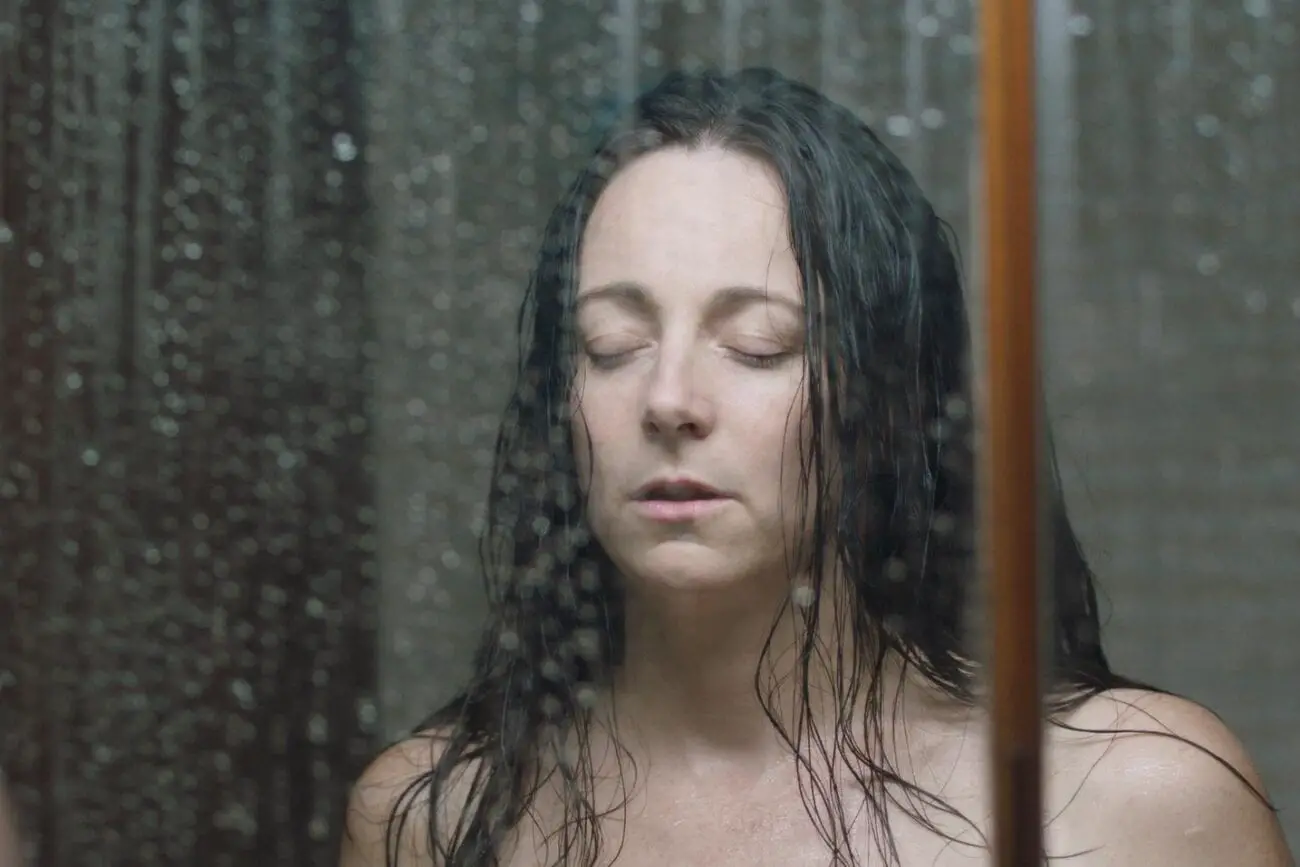I have been watching, on average, four films a day since the BFI London Film Festival began, all chosen for me by the festival curators. So it is to the festival’s considerable credit that I have enjoyed nearly every one of them. However, the law of averages had to win out sooner or later and of the more than fifty films screening as part of the festival, at least one day generally defined by disappointment was inevitable. Such was sadly the case with October 13th, which though not at all bereft of enjoyable moments, brought, on balance, the weakest crop of films so far, with Another Round, A Common Crime, One Man and His Shoes, The Salt in Our Waters and Rose: A Love Story.
Another Round
The day started decently with the only film of the five I had any real expectations of one way or the other, that being the reunion of director Thomas Vinterberg with The Hunt star Mads Mikkelsen. Like that superlative work, Another Round begins with traditional revelries around a lake, but the subsequent films could hardly have more different tones. Vinterberg’s films have often shown a capability of great conviviality and warmth at times, and he lets this side of his work loose here with an affectionately romanticised portrait of four mostly loveable drunkards.

There’s a sketch in the surreal British sketch comedy That Mitchell and Webb Look which posits the existence of the “inebriati”, a secret society who have discovered the secret to success and happiness is a constant low level of intoxication. One and a half drinks inside you is the supposed secret to all the world’s ills. One character in Another Round seriously proposes such an idea, backing it up by citing philosophical sources, and he and his friends, all schoolteachers, decide to put it to the test, embarking upon their bender with a combination of epicurean and scientific interest. Among these friends is Martin (Mads Mikkelsen), who has recently been brought up by his students and their parents for being too dull and giving everyone mediocre grades, and who seems a prime candidate for a drop of courage each morning.
As their drinking inevitably begins getting out of hand, it starts to refract the issues in their own lives, distancing them from their sober surroundings and families. By turns funny, poignant and simply rather uncomfortable in the way its romanticises alcohol as a social lubricant, Another Round is a resolutely lightweight and middle brow affair, that even as Mads Mikkelsen does jazz ballet to the strains of Scarlet Techno’s “What a Life” isn’t quite as uncomplicatedly good fun as it seems to be aiming to be.
Rose: A Love Story
Another film competing for the festival’s Best Feature Debut award is Jennifer Sheridan’s grounded romantic horror Rose: A Love Story, written by and starring Matt Stokoe opposite Sophie Rundle. A strange combination of It Comes at Night and Only Lovers Left Alive, Rose finds itself poised to capitalise on a sinister reworking of horror tropes in a familiar setting, and hot button imagery of seclusion, disease, isolation and even face masks.
Stokoe and Rundle play Sam and Rosie, a bad-tempered hunter and his insecure writer wife living in seclusion in the frozen woods, where he attends to her peculiar needs and locks her in when he goes out hunting. After slowly peeling back the covers on their strange arrangement, a complicating element is introduced in the form of the sudden arrival of Amber (Olive Gray), a teen runaway lost in the woods whom the two are forced to take in, against Sam’s better judgement, at the risk of exposing Rose’s secret.
Despite the bland title, Rose is an oddly realistic and somewhat successful exploration of vampire tropes and mythos. The granularly detailed setting works well. However, the mixture of tones, and the unconvincing central contrivance of how Amber came to be out so far in the woods, don’t quite ring true, leaving it a rather hollow experience. Thematically the film doesn’t come alive as a romance and it doesn’t explore enough territory of one genre to pull in one solid direction, feeling non-committal and vague instead of well-balanced.
The Salt In Our Waters
The recipient of a Spike Lee scholarship, writer-director-producer Rezwan Shakir Sumit will be competing with Sheridan for that Best Debut Feature award with his Bangladeshi drama The Salt In Our Waters. A film which explores familiar ideas of challenging tradition and the urgent need for reform, with a story that is sadly equally familiar and equally traditional by Hollywood standards.
Rudro is a young artist and son of a coastguard who arrives in a small coastal fishing community looking for inspiration for his art. At first his temporary new home seems idyllic, but it soon reveals itself to be under the control of a local chairman, using religious superstition to maintain a hold over the community, a hold Rudro, his iconoclastic artwork, and modern, progressivist ideals fundamentally challenge.
It’s a disappointingly formulaic story, with the backward-looking community threatened when an urbane outsider brings new ideas in from the outside, delighting the young people and incensing the village’s elder. The writing is certainly attempting to make its portrait of a rural Bangladeshi community as accessible to international audiences as possible but the formulaic story does it no favours in the artistic stakes.
Set against a backdrop of climate change, told from the locus most immediately effected by it, there are a few moments that do attain a level of urgency and there are some shots that are effective and quite beautiful. However, the combination of a slow pace and a dispiritingly generic story arc sadly results in a less than inspiring end product.
One Man and His Shoes
It’s perhaps ironic that the film I had lowest expectations for emerged as easily the most engaging of the five. It’s often considered the measure of a documentary how well it grips your interest in spite of your own ignorance or indifference to its subject matter. I care nothing for skateboarding, beekeeping or basketball, but Minding the Gap, Honeyland and Hoop Dreams each managed to make them seem like the most important things in the world.
Nonetheless, a documentary about a brand of shoes was going to have a real uphill climb. To many the Air Jordans are much more than a brand of training shoe, but to me, they are that and nothing more, and that isn’t much. I never owned a pair, nor aspired to. However, much as Minding the Gap is actually about domestic violence, One Man and His Shoes is about neither a man, nor really his shoes. By lassoing in connected issues and skillfully running a thread through them, One Man and His Shoes manages to explore the cultural influence of the Air Jordan in convincing scope. In a smooth arc, the drug related death of an NBA star is tied to the drug war, mass incarceration, poverty, the economic policies of the Reagan era, and ultimately the birth of neo-conservativism.
The documentary plays a long game, with the film taking a while to get around to its real purpose. For the first hour or so, Yemi Bamiro’s documentary sets up the history of the sneakers and the hugely influential endorsement campaign with basketball star Michael Jordan. Scouted for his talent as an underdog with the flailing Chicago Bulls team, Nike put everything into backing him as a spokesman, eventually recruiting Spike Lee to make a massively influential ad series under the guise of his Morris Blackman character from She’s Gotta Have It. The film’s exploration of the formative influence of the imagery and iconography used in these advertisements on black culture and identity was certainly fascinating, but it’s only in the film’s last act that it shows its hand and reveals its motives.
As the issues of exclusivity and mania around the shoe line increased, it began to lead to a shockingly widespread phenomenon of murders committed over the shoes. These last twenty minutes have been the most discussed as this is the most serious and attention grabbing side of the film, and I have to agree with many other critiques I have seen opining that the subject matter covered in this segment of the film really should have had more focus throughout the film. It should have been a full second part of the film, as opposed to its last twenty minutes, signalled by an abrupt gear shift.
This segment brings home many of the themes discussed earlier in the festival in One Night in Miami… concerning the social responsibility of public figures to fulfil a moral obligation as a social leader. However, the film does draw a somewhat vague picture of what it considers Nike and Jordan’s responsibilities for this violence to be, simply posting a grieving mother on one side and a company making billions of dollars on the other and relying on the emotions of the audience to connect the dots.
A Common Crime
In the last entry in this coverage, I awarded the label of the festival’s weakest film to Argentine thriller The Intruder, however, I’m sorry to say that another Argentine thriller has arrived to challenge it, as A Common Crime is easily the dullest experience of the festival. I swear I’ve nothing against Argentina, or its thrillers, The Secret in Their Eyes is one of my favourite films of the 2000s. However, there is a degree to which both The Intruder and A Common Crime fail in the same regard, lacking a sense of clear purpose or direction.

The film follows Cecelia (Elisa Carricago), a middle-class professor of Marxist economics who, when her housekeeper’s son comes knocking at her door in the middle of the night in a thunderstorm, frightened, pretends not to be at home. He leaves, pursued by police sirens, and a few days later is found dead, leaving Cecelia wracked with guilt over having left him to his fate out of cowardice and complacency. She is then left to decide whether to come forward with her information, and admit that she failed to intervene as well as potentially expose herself to police harassment, or swallow her truth and remain complicit in police violence.
In spite of this strong narrative hook, A Common Crime remains frustratingly dramatically inert and annoyingly slow-paced. At times it achieves a somewhat sinister and unnerving atmosphere but nothing ever comes of it. The minute slice of life approach to its subject matter unfortunately does little to nothing to convey Cecelia’s inner turmoil or the wider social issues it perhaps hopes to address and Carricago brings nothing of use to the role. As Cecelia becomes increasingly distracted and confused in her daily life, sinking into a depression, the film remains cinematographically uninspired and singularly lacking in intensity. I cannot deny that director Francisco Marquez clearly has a tremendous amount of confidence in his approach, but it is an assurance I found to be misplaced. The film’s ultimate ending felt both trite and misplaced and rejected the lucid social criticism which had been the preceding film’s one real note of interest.



